
Fort Detrick is a United States Army Futures Command installation located in Frederick, Maryland. Fort Detrick was the center of the U.S. biological weapons program from 1943 to 1969. Since the discontinuation of that program, it has hosted most elements of the United States biological defense program.
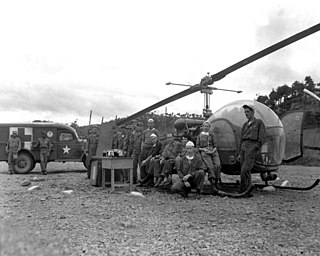
Mobile Army Surgical Hospitals (MASH) were U.S. Army field hospital units conceptualized in 1946 as replacements for the obsolete World War II-era Auxiliary Surgical Group hospital units. MASH units were in operation from the Korean War to the Gulf War before being phased out in the early 2000s. Each MASH unit had 60 beds, as well as surgical, nursing, and other enlisted and officer staff available at all times. MASH units filled a vital role in military medicine by providing support to army units upwards of 10,000 to 20,000 soldiers. These units had a low mortality rate compared to others, as the transportation time to hospitals was shorter, resulting in fewer patients dying within the "Golden Hour", the first hour after an injury is first sustained, which is referred to in trauma as the "most important hour". The U.S. Army deactivated the last MASH unit on February 16, 2006, and the successors to Mobile Army Surgical Hospitals are combat support hospitals.

The U.S. Army Medical Command (MEDCOM) is a direct reporting unit of the U.S. Army that formerly provided command and control of the Army's fixed-facility medical, dental, and veterinary treatment facilities, providing preventive care, medical research and development and training institutions. On 1 October 2019, operational and administrative control of all military medical facilities transitioned to the Defense Health Agency.
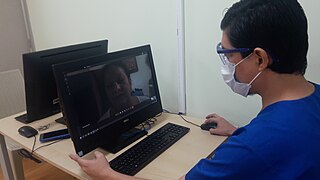
Telehealth is the distribution of health-related services and information via electronic information and telecommunication technologies. It allows long-distance patient and clinician contact, care, advice, reminders, education, intervention, monitoring, and remote admissions. Telemedicine is sometimes used as a synonym, or is used in a more limited sense to describe remote clinical services, such as diagnosis and monitoring. When rural settings, lack of transport, a lack of mobility, conditions due to outbreaks, epidemics or pandemics, decreased funding, or a lack of staff restrict access to care, telehealth may bridge the gap as well as provide distance-learning; meetings, supervision, and presentations between practitioners; online information and health data management and healthcare system integration. Telehealth could include two clinicians discussing a case over video conference; a robotic surgery occurring through remote access; physical therapy done via digital monitoring instruments, live feed and application combinations; tests being forwarded between facilities for interpretation by a higher specialist; home monitoring through continuous sending of patient health data; client to practitioner online conference; or even videophone interpretation during a consult.

The Army Medical Department of the U.S. Army (AMEDD), formerly known as the Army Medical Service (AMS), encompasses the Army's six medical Special Branches. It was established as the "Army Hospital" in July 1775 to coordinate the medical care required by the Continental Army during the Revolutionary War. The AMEDD is led by the Surgeon General of the U.S. Army, a lieutenant general.
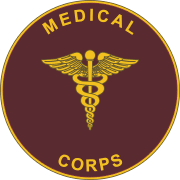
The Medical Corps (MC) of the U.S. Army is a staff corps of the U.S. Army Medical Department (AMEDD) consisting of commissioned medical officers – physicians with either an M.D. or a D.O. degree, at least one year of post-graduate clinical training, and a state medical license.

The Walter Reed Army Institute of Research (WRAIR) is the largest biomedical research facility administered by the U.S. Department of Defense (DoD). The institute is centered at the Forest Glen Annex, in the Forest Glen Park part of the unincorporated Silver Spring urban area in Maryland just north of Washington, DC, but it is a subordinate unit of the U.S. Army Medical Research and Development Command (USAMRDC), headquartered at nearby Fort Detrick, Maryland. At Forest Glen, the WRAIR has shared a laboratory and administrative facility — the Sen Daniel K. Inouye Building, also known as Building 503 — with the Naval Medical Research Center since 1999.

The Carl R. Darnall Army Medical Center is a United States Department of Defense medical facility at Fort Cavazos, Texas. It provides medical care to servicemembers and their families, along with veterans and their dependents, in and around the largest U.S. military installation in the world. Named after inventor of water chlorination Brigadier General Carl Rogers Darnall, MD., the core of the medical center is a state of the art 947,000-square-foot hospital. The facility opened in 2016, and includes a full primary care and emergency medical facility, including a level III trauma center, and specialized care in obstetrics and gynaecology, orthopedics, and behavioral health. The hospital provides treatment to nearly 3,000 patients daily. The medical center is one of the largest in the Military Health System, comprising more than 105 buildings in addition to the main facility, spread over Fort Cavazos, three local communities, and a clinic at the Red River Army Depot in Bowie County, Texas, outside of Texarkana. The medical center and its outlying facilities are staffed nearly entirely by uniformed servicemembers of the U.S. Army, however in 2019, the administrative control of the facility was shifted from United States Army Medical Command to the Defense Health Agency, an integrated joint Department of Defense combat support agency. All patients of the facility are insured and billed through Tricare, the health insurance system of the DoD. The medical center is led by Colonel Richard G. Malish.

The term military medicine has a number of potential connotations. It may mean:
The United States Army Medical Research and Development Command (USAMRDC) is the United States Army's medical materiel developer, with responsibility for medical research, development, and acquisition.

S. Ward "Trip" Casscells was an American cardiologist who served with the U.S. Army in Iraq and later was Assistant Secretary of Defense for Health Affairs. Among other honors, he was the recipient of the Distinguished Public Service Medal, the Army's Order of Military Medical Merit, and the General Maxwell Thurman Award.

Lester Martínez López is an American government official and former Army general who serves as the Assistant Secretary of Defense for Health Affairs since 2023. While in the United States Army, Martínez López was the first Hispanic to head the Army Medical and Research Command at Fort Detrick, Maryland. His responsibilities included overseeing the Army Medical Research Institute of Infectious Disease, which develops antidotes and vaccines for diseases soldiers might face on the battlefield.
Yang Xiao is a professor of computer science at the University of Alabama.

The 28th Combat Support Hospital was a Combat Support Hospital of the United States Army. It was first constituted in 1943 and served in China during World War II. During the Gulf War in 1990, it was the first Army hospital unit established and deployed into Iraq with combat forces of the XVIII Airborne Corps. More recently it has been involved in relief operations following natural disasters and has undertaken several recent deployments to Iraq. The unit fell under the command of the 44th Medical Brigade and was based at Fort Bragg, North Carolina.
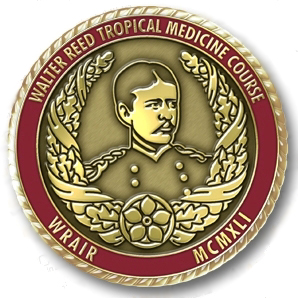
The Walter Reed Tropical Medicine Course at Walter Reed Army Institute of Research (WRAIR) is one of the many Tropical Medicine Training Courses available in the US and worldwide. It is an intensive 5-day course and a 3-day short course, created to familiarize students with tropical diseases they may encounter overseas. The course is open to Physicians, Physician Assistants, Nurse Practitioners, ESO, 18D, or other medical personnel. The course is run by the military and designed for personnel of the US Military and several other US government agencies.
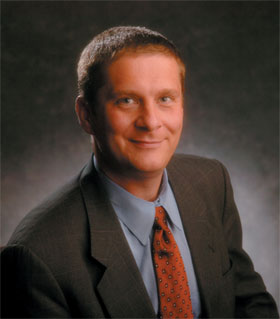
Timothy J. Broderick, F.A.C.S., is Professor of Surgery and Biomedical Engineering at the University of Cincinnati, where he has served on the faculty since 2003. He also serves as Chief of the Division of Gastrointestinal and Endocrine Surgery and is Director of the Advanced Center for Telemedicine and Surgical Innovation (ACTSI). He has flown on the NASA KC-135 parabolic laboratory and dived in the NASA Extreme Environment Mission Operations (NEEMO) program to develop advanced surgical technologies for long duration space flight.
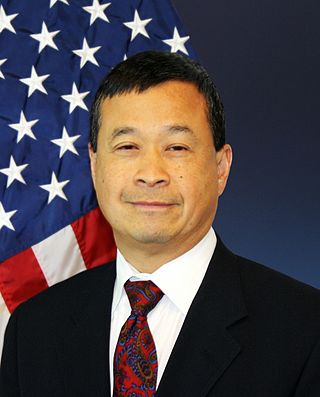
Geoffrey S. F. Ling is a medical doctor who retired from the United States Army as a colonel and was the CEO of On Demand Pharmaceuticals. He served as the founding director of the Defense Advanced Research Projects Agency (DARPA) Biological Technologies Office from 2014 until 2016. He was considered to be the "US Army's premier subject matter expert on traumatic brain injury (TBI)", and was for years the only neuro-intensive care specialist in the US military.
Todd E. Rasmussen, MD, FACS is a Professor and Vice Chair for Education in the Department of Surgery at Mayo Clinic, Rochester and a Senior Associate Consultant in the Division of Vascular and Endovascular Surgery. Prior to joining the Mayo Clinic, he had a 28-year career in the military, retiring as an Air Force Colonel in 2021. His most recent military assignment was as Associate Dean or Research at the Uniformed Services University of the Health Sciences and an attending surgeon at the Walter Reed National Military Medical Center. A native of Kansas, Rasmussen completed his undergraduate degree at the University of Kansas and his medical degree at Mayo Medical School (1993), followed by surgical training at Wilford Hall Medical Center at Lackland Air Force Base and vascular surgery specialty training at Mayo Clinic.
Robert A. Vigersky is an American endocrinologist, Professor of Medicine at the Uniformed Services University of the Health Sciences, and pioneering military healthcare professional. His career has focused on diabetes care, research, and advocacy, publishing 148 papers and 118 abstracts in the fields of reproductive endocrinology and diabetes. Vigersky is a retired colonel in the U.S. Army Medical Corps, past president of the Endocrine Society, and recipient of the General Maxwell R. Thurman Award. He served in Iraq, Korea and Germany and is the recipient of military awards including the U.S. Army's Legion of Merit in 2009.

Deydre S. Teyhen is a U.S. Army brigadier general and the 20th Chief of the Army Medical Specialist Corps. Teyhen also serves as Commanding General, Brooke Army Medical Center (BAMC), and the Deputy Market Director, San Antonio Market, Defense Health Agency. Teyhen, a physical therapist, is the Army's first active duty Medical Specialist Corps officer and physical therapist promoted to brigadier general.















